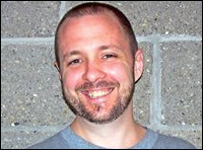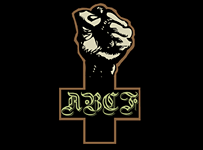| Here are a few questions and answers we put together to help people that are not familiar with the legal aspects of the case understand what exactly went on. On December 7, 2005 federal agents went to the offices of WomensLaw.org to arrest Daniel. No one understood what the charges were initially and did not know what was to happen the following few months. Daniel was taken in handcuffs from his job and brought to Metropolitan Correctional Center [MCC] in lower Manhattan. That night, while he was in custody, federal agents raided the East Village apartment of Daniel and his wife. They turned most of the place upside down and walked out with many of their possessions including computers, personal photographs, tax papers, all of Daniel's school textbooks and homework, videotapes, DVDs and more. Because no one was home at the time, neighbors of Daniel's demanded to see proper identification and paperwork from the federal agents to OK the search. The agents told neighbors they were investigating a "domestic terrorism" case. Although government officials and media have carelessly used this term, this is not a terrorism case. (Almost a year into the case, the prosecution announced their plans to fight at sentencing for a "terror enchancement" at the change of plea hearing in November, 2006.) Despite this, while jailed at MCC, Daniel was not allowed to use the phone and he was held on what guards called 'the terror wing'. On December 8, 2005, Daniel appeared in the federal courthouse in Brooklyn. Dozens of friends and family were there in a show of support and sat in on the hearing. Objections raised by Daniel's attorney at court extended the hearing to an additional day. A judge in Oregon had signed off on Daniel's search and arrest warrant under a provision of the USA Patriot Act. Despite Daniel's family offering to put up a significant amount of money and property to secure his release so that he could fly to Oregon unescorted to face charges, the judge ruled in favor of removal to Oregon and he remained in federal custody. Completely unlike what one might see on TV, Daniel was unable to communicate a single word to anyone aside from his lawyer in court. Daniel spent the next 14 days in transit across the United States at various federal detention centers. His family and friends did not know where he was or when he would arrive in Oregon. He was flown across the country in stages, first to Oklahoma, then to California, and finally to FCI Sheridan. He was shackled at the ankles and wrists throughout the flights. On December 21, he was arraigned in Oregon. From December 21 to January 3, he was kept on suicide watch because of a co-defendant's suicide in jail. Daniel was designated Maximum 1 status for much of the time he was housed at Lane County Corrections in Eugene, Oregon. The jail refused to provide a vegetarian diet despite many and varied attempts to request food he could eat. On Christmas Day, Daniel spoke to his wife on the phone for the first time since the morning of December 7th. Daniel's detention hearing was on January 25, 2006, in front of Judge Aiken. He was granted release on $1.6 million on bail which was put up by his family. The judge received over 75 letters in support of Daniel's release on bail. Because of bureaucratic procedures and paperwork, Daniel waited until February 8th before he was released from jail. Daniel was on house arrest for seven months in his sister's NYC apartment, which he shared with her, his brother-in-law, his niece and his wife. Last summer he was allowed to attend a few short classes which will count towards his Master's program in acupuncture. On November 9, 2006, after months of negotiations and consideration, Daniel, along with Jonathan Paul, Joyanna Zacher and Nathan Block, pled guilty to some of the many charges. He was sentenced to 7 years in prison on June 4, 2007 and began serving his time on July 2, 2007. Daniel has been accepted to a liberal arts graduate program at an accredited university and intends to complete a Master's degree in Sociology while imprisoned in order to be in the best possible place upon release from prison. He has been designated to a low security level facility in Minnesota. For more information on Daniel's background, please go here. What were Daniel's original charges and the proposed sentencing? He was charged with 2 counts of conspiracy to commit arson, 14 counts of arson (each carry a 5 year mandatory minimum) and 2 counts of use or possession of a destructive device. If he went to trial and was found guilty of one of these two latter charges, Daniel faced a 30 year mandatory minimum sentence. If found guilty of two, Daniel faced a MANDATORY LIFE SENTENCE. Was anyone hurt in any of these actions? It is important to note that no human or animal was injured at all in any of the incidents. There is absolutely no evidence that the incidents were intended to harm anyone. Why was he charged on the federal level, not state? Daniel was being charged on the federal level because the incidents took place at corporations that engage in interstate commerce. Does the plea agreement mean Daniel is guilty? Daniel has admitted his guilt in the two arsons he was charged with – the fire at Jefferson Poplar and the fire at Superior Lumber. The government dropped the charges that he used destructive devices. Can I read Daniel's plea agreement? Yes. You can download Daniel's Plea Agreement here. This document was made available to the public right after the plea hearing on Novembr 9, 2006. On November 9, 2006, after months of negotiations and consideration, Daniel, along with Jonathan Paul, Joyanna Zacher and Nathan Block, pled guilty to some of the many charges. We cannot emphasize enough what an extremely difficult decision this was for Daniel and we will continue to give him our full support. We do not want there to be any confusion about Daniel's plea agreement so we have posted it on the site. Daniel agreed to plead guilty with the understanding that he would not implicate or identify anyone at all other than himself. The other three remaining co-defendants entered pleas with the same terms. Daniel has done everything possible to maintain his integrity, and he wants to be as open about his agreement as possible. You can read Daniel's statement to Judge Aiken and Daniel's lawyers' statement here. What exactly did Daniel do? Daniel was a lookout on one of the incidents, and he helped set the fire at the other incident. What sentence was Daniel facing? Daniel's lawyers asked for a sentence of no more than 63 months, or no more than 18 months higher than what Daniel’s co-defendant, Suzanne Savoie, receives, whichever is less. Ms. Savoie has entered pleas to the same charges as Mr. McGowan. The only difference between Ms. Savoie and Mr. McGowan, in this case, is that Ms. Savoie is cooperating with the government, while Mr. McGowan is not. On June 4, 2007, Judge Aiken sentenced Daniel to 7 years in prison. Why did Daniel agree to a longer sentence than Ms. Savoie? Daniel recognizes that because he has chosen to honor his principles and not cooperate in the government’s investigation, he will probably serve more time than some of the defendants who agreed to cooperate. Whether or not this is fair is a question for a different day. Daniel accepts it. He agreed to terms with the government that essentially include a premium for his decision not to cooperate. Why was it important to Daniel to not cooperate? Did it really matter? Didn’t the government already have all the evidence? For Daniel, this is a matter of principle. It is a matter that goes to his integrity. He walked away from these kinds of actions a long time ago. He made a decision that even if he ever chose to talk about what he personally did, what he might know about other people would go with him to the grave. Did Daniel talk to the government at all? Yes. As part of his agreement, he told government investigators about his own personal role in these actions. He answered questions about what he, personally, did. He did not disclose any information that would identify, or tend to incriminate another person, whether directly or indirectly. This is spelled out in the plea agreement, which is available to the public. Why did the government agree to a reduced sentence if he would not cooperate? The government agrees in many cases to reduced sentences for defendants who do not provide full cooperation. In this case, what the remaining four defendants did was to help the government resolve the entire case by all coming forward at once and agreeing to admit to their personal responsibility. This was of enormous benefit to the government in resolving this case without a trial and perhaps sparing the government from sharing information it did not want to share with the defense. What was the agreement with the government about the NSA motion? The government made dropping the motion and abandoning the request for any kind of a response an absolute condition of resolving the case without a trial. We have no more information about the existence of NSA surveillance of Daniel today than we did when we requested the information originally. When was Daniel sentenced? He was sentenced to 7 years in prison on June 4, 2007 and began serving his time on July 2, 2007 at MDC Brooklyn. He was designated to a low security prison in Minnesota, quite far from home. What is "eco-terrorism"? This is a term that was created by 'Wise Use' founder and extreme anti-environmentalist Ron Arnold of the Center for the Defense of Free Enterprise with the intention of turning people against environmentalists. Ron Arnold, along with creating the word 'eco-terrorism' has also stated, "We want to destroy environmentalists by taking away their money and their members," [New York Times, December 1991] and "Our goal is to destroy, to eradicate the environmental movement ... We're mad as hell. We're not going to take it anymore. We're dead serious - we're going to destroy them," [Toronto Star, 1991]. Calling someone an "eco-terrorist" is like the former use of the word "communist". It is not intended to spur debate on the topic but instead to scare potential supporters away from the case. As many supporters of Daniel are New Yorkers, many feel this is a horrible insult to the victims of the real terrorism that many witnessed on 9/11 and affected them very personally. While Ron Arnold and the corporations that fund his reactionary form of public relations use the word quite liberally, Daniel's family and friends abhor the use of the term as it cheapens the very real terror that exists in this world whether it is fundamentalists targeting people or governments bombing people. What kind of activist work has Daniel done? For the last 8 years, Daniel has been involved in many different campaigns struggling for social justice, protection of the environment and human rights. He has worked for non-profits that focus on national forest protection, rainforest conservation and the rights of indigenous people. Most recently, Daniel worked on counter-recruitment as a proactive response to the government's wars. He helped organize a picket of a local military recruitment center in his old neighborhood in Brooklyn and passed out literature to high school kids that explained many non-military options for paying for college. Daniel also helped organize 'really, really free markets' in NYC which are markets where everything (food, clothes, services, books, etc) are free and available to all. In 2003-4, Daniel was one of a group of people who created and maintained a website, which was a hub for organizing against the hosting of the Republican party convention in Daniel's hometown. He attended many meetings, hosted fundraisers and conducted media interviews with national and international publications. When he was arrested, Daniel was employed as a webmaster for Womenslaw.org, an organization that operates a website with resources on domestic violence. Daniel's activism has been very public, and demonstrates his deep commitment to human dignity and environmental protection. What can I do to help? Get more information about setting up outreach events, donating to Daniel's legal and education funds, and spreading the word about the case here. We hope that this helps answer any questions you may have had. Thanks for the support. |
||||||||||||
|


